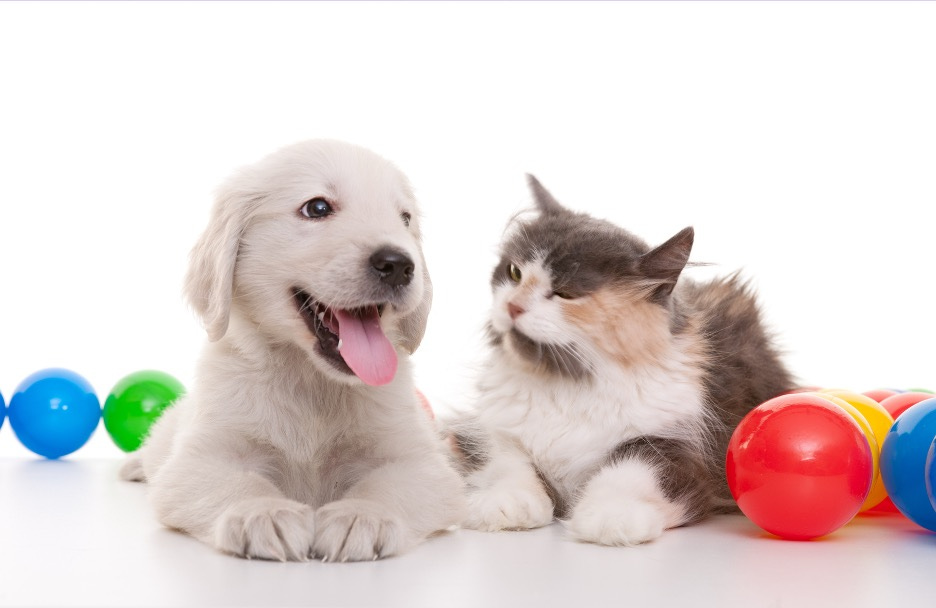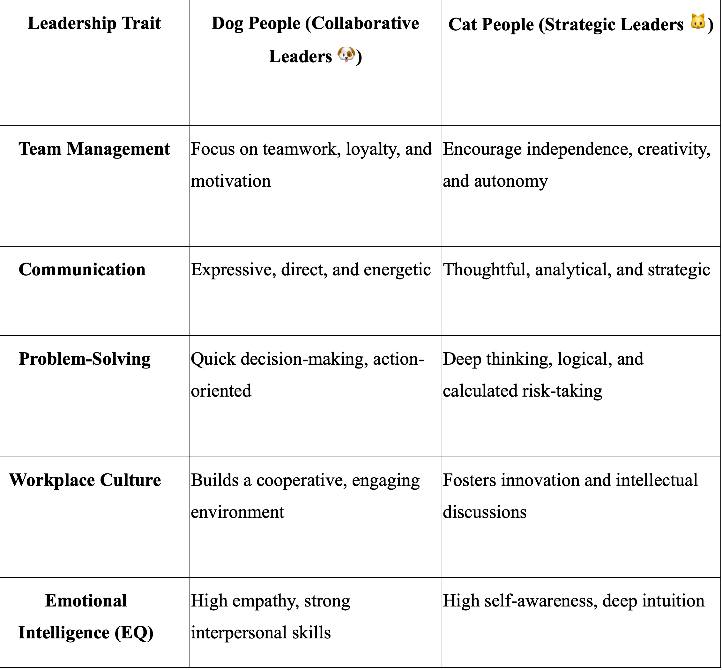Dogs come when they’re called; cats take a message and get back to you later.” — Mary Bly
Many studies suggest that owning a pet—whether a dog or a cat—can shape a person’s leadership style, teamwork abilities, and emotional intelligence (EQ). The traits that define dog and cat people often translate into workplace behaviors and leadership approaches. As a lover of golden retrievers, I think, whichever you choose is a matter of personal choice.
I admire cats’ independence and calculated risk-taking, whereas dogs encourage teamwork, engagement, and cooperation, opening us to new possibilities.
As an introvert, I trust that a blend of attributes ensures our success throughout life and our career. Understanding the necessity of small talk, we pick up subtle clues; creating instant connections.
Say you are neither a dog or cat person, rest assured I’ve got something just for you!
Women and cats will do as they please, and men and dogs should relax and get used to the idea.” — Robert A. Heinlein
1. Leadership Styles: Dog vs. Cat People
📌 Dog-person leaders tend to be charismatic, relationship-driven, and motivational—great for people-focused industries like sales, marketing, or HR.
📌 Cat-person leaders are often strategic, detail-oriented, and innovative—suited for research, technology, or creative industries.
Having the gift of oratory, writing, and connecting with others, I embrace these talents to ignite the genius in others, ultimately making the world a better place. Also being strategic and forward-thinking, I have successfully helped coaching clients turn dreams into reality.
What special talent(s) do you possess and how are you using them to create the life of your dreams?
2. Pet Ownership and Emotional Intelligence (EQ)
🐾 Studies suggest that pet ownership enhances key emotional intelligence traits crucial for leadership and teamwork, such as:
✔ Empathy & Compassion: Interacting with pets improves emotional sensitivity, making leaders more attuned to employees’ needs. (Archer, 1997)
✔ Resilience & Stress Management: Owning a pet reduces cortisol (stress hormone) and increases serotonin, helping leaders stay calm under pressure. (Allen et al., 2001)
✔ Social Bonding & Trust: Pet owners tend to develop higher trust and social skills, making them more effective at team-building and conflict resolution. (McNicholas & Collis, 2000)
✔ Patience & Adaptability: Caring for pets teaches adaptability and patience, which is essential for navigating workplace challenges.
During my two tours in Israel I was grateful to have had my dog, who provided companionship and emotional support during periodic rocket attacks and the pandemic.
3. Teamwork & Collaboration: Dog vs. Cat Personalities in Teams
• 🐶 Dog-person employees thrive in collaborative environments, preferring teamwork, brainstorming, and shared goals.
• 🐱 Cat-person employees excel in independent roles, thriving in positions that allow autonomy and deep work.
💡 Diverse teams benefit from both approaches! Organizations need dog-person team players for collaboration and morale and cat-person analytical thinkers for strategy and problem-solving.
Having worked on teams throughout my career, the most valuable lesson learned was the power of cultivating relationships to accomplish our mission; meant prioritizing team needs over self-interest, ensuring team and organizational success.
4. Workplace Culture: How Pets Influence Leadership and Team Dynamics
🏢 More workplaces are embracing pet-friendly cultures, recognizing the benefits pets bring to employees’ productivity and well-being:
• Dog-friendly offices (e.g., Google, Amazon) promote collaboration, stress relief, and bonding.
• Pet therapy programs have been linked to higher employee engagement and lower burnout rates.
• Flexibility for pet owners increases job satisfaction and work-life balance.
Statistic: A study by Banfield Pet Hospital (2017) found that 82% of employees feel more loyal to companies with pet-friendly policies.
I have seen firsthand how having service animals in the workplace has a calming effect on the employee while reducing stress in the office.
Call to Action for Pet Owners
Whether you resonate with the loyal, energetic nature of dog people or the independent, strategic mindset of cat people, both styles bring value to leadership and teamwork.
🚀 Ask Yourself:
✔ Are you a motivational, hands-on leader (dog person) or a strategic, independent thinker (cat person)?
✔ How can you balance teamwork and autonomy in your leadership approach?
✔ Would a pet-friendly office culture benefit your team’s well-being?:
“Dogs serve people, but people serve cats.” — Temple Grandin
What It Means If You’re Neither a Dog or Cat Person
While many people strongly identify as dog people or cat people, some don’t feel a strong preference for either. This could suggest unique personality traits, lifestyle preferences, or different forms of connection with animals and people.
Possible Personality Traits of Someone Who Isn’t a Dog or Cat Person
1. Highly Independent & Unconventional Thinker 🧠
• You may not conform to traditional pet preferences and prefer non-traditional companionship (e.g., exotic pets, plants, or solitude).
• You value personal space and freedom rather than commitment to a pet’s needs.
There was a time when I had no pets, it was freeing; no expense or responsibility. I opted for solitude instead ensuring personal space and freedom.
2. Minimalist or Low-Maintenance Lifestyle 🏡
• Owning a pet requires time, responsibility, and care. If you prefer low-maintenance living, you may be drawn to pet-free lifestyles.
• You may prioritize travel, career goals, or personal projects that don’t align with pet ownership.
Having worked internationally, I know the logistics of moving with pets are not only costly but also stressful.
3. Practical & Logic-Driven 📊
• Some people view pet ownership as an emotional, time-consuming, or financial responsibility they’d rather not take on.
• You may be pragmatic, rational, and prioritize functionality over companionship needs.
While serving in Iraq, it was impossible to have pets, so we found comfort in being there for one another.
4. Different Animal Preferences 🦜🐠🐍
• You may enjoy animals but prefer species other than dogs or cats, such as birds, reptiles, fish, or small mammals.
• This could suggest curiosity, uniqueness, and appreciation for less conventional relationships with animals.
This is a costly and time consuming expense, requiring regular maintenance.
5. More People-Oriented than Animal-Oriented 👥
• Some people feel a stronger bond with humans than animals, prioritizing social interactions, friendships, and professional connections over pet companionship.
Being an introvert, I prefer dogs over people. However, ”people who need people are the luckiest people in the world,” according to Barbara Streisand, and I agree wholeheartedly.
6. Highly Clean & Orderly 🧼
• If cleanliness is a top priority, you might prefer a pet-free home due to concerns about fur, allergens, odors, or mess.
Maintaining a clean and orderly home makes space for peace and harmony.
7. Not Emotionally Attached to Animals❓
• Some individuals simply don’t feel an emotional connection to animals like others do, which is entirely normal.
• This doesn’t mean they lack empathy—it just means they express it in different ways (e.g., helping people instead of animals).
Scientific Insights on People Who Don’t Like Pets
🔬 Studies on pet attachment suggest that pet ownership is largely influenced by upbringing, personality traits, and life experiences:
• Early Exposure Matters: People who grew up with pets are more likely to develop positive associations with animals.
• Introverts vs. Extroverts: Introverts may be more inclined to independent pets (cats, reptiles), while extroverts prefer social pets (dogs, birds). (Gosling et al., 2010)
• Allergies & Sensory Sensitivities: Some individuals have allergies, sensory preferences, or phobias that make pet ownership unappealing.
“A leader is one who knows the way, goes the way, and shows the way.” — John C. Maxwell
Famous People Who Didn’t Own Pets
🐾 Some well-known figures were not dog or cat people, but they still made significant contributions to society:
• Albert Einstein – Preferred solitude and intellectual pursuits over pets.
• Marie Curie – Focused entirely on scientific discoveries rather than animal companionship.
• Nikola Tesla – Had a strong love for birds but didn’t own dogs or cats.
Conclusion
It’s Completely Okay to Be Pet-Free!
🚀 Being neither a dog person nor a cat person doesn’t mean you’re missing out—it just means your personality, lifestyle, or values align differently.
✔ You may prefer human connections, unconventional pets, a minimalist lifestyle, or independence.
✔ Not everyone bonds with animals the same way—and that’s okay!
✔ If you still love animals but don’t want the commitment, you can always volunteer, donate, or support conservation efforts.






I used to have a dog, and I must say this precisely describes me as a leader 🥰
Interesting post Margaret. I have had both cats and dogs (also guinea pigs, budgies and goldfish). Not sure how they affected my leadership style - all inclusive?